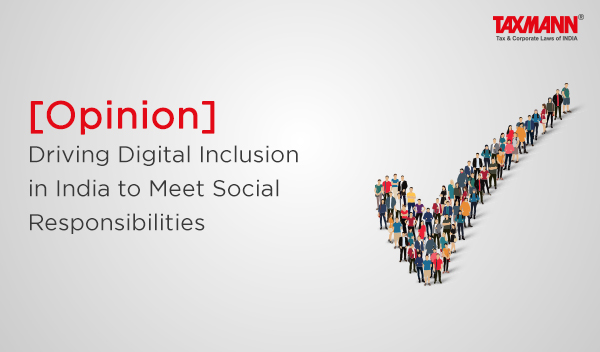[Opinion] Driving Digital Inclusion in India to Meet Social Responsibilities
- Blog|News|Company Law|
- 2 Min Read
- By Taxmann
- |
- Last Updated on 6 December, 2023

CS Hasti Vora – [2023] 157 taxmann.com 77 (Article)
“Digital is the world of tomorrow, and digital inclusion is about creating one world to avoid the split of society into two conflicting parts”.
Paul Hermelin, Chairman of Capgemini
In an era dominated by technological advancements, digital inclusion has become a crucial factor in ensuring equitable access to opportunities. Organizations are embracing emerging technologies to revolutionize their operations. This strategic shift towards technological integration marks a pivotal moment in reshaping how businesses manage, optimize, and ethically govern supply network. The rapid advancement of emerging technologies such as Artificial Intelligence (AI), Internet of Things (IoT), blockchain, and data analytics has opened new avenues for supply chain management. These tools offer unparalleled opportunities to enhance efficiency, transparency, and sustainability across the entire lifecycle. In a country as diverse as India, where socioeconomic gaps persist, Corporate Social Responsibility (CSR) initiatives have emerged as a vital force in driving digital inclusion, bridging the divide, and fostering empowerment among marginalized communities.
Understanding the Digital Divide
India’s narrative is a tale of contrasting realities. While urban areas thrive in the digital age, rural regions and underserved communities often lack access to basic technological infrastructure. This digital divide exacerbates disparities in education, healthcare, and employment opportunities. However, CSR initiatives have stepped in to address these disparities by leveraging technology as an equalizer.
Empowering through Education
Education is the cornerstone of empowerment. CSR initiatives in India have recognized this and focused on imparting digital literacy in rural and underserved areas. Programs are designed to train individuals, irrespective of age or background, on fundamental digital skills. Through workshops, training modules, and community engagement, these initiatives aim to equip individuals with the necessary skills to navigate the digital landscape, access information, and utilize online resources effectively.
For instance, Tata Consultancy Services’ (TCS) Adult Literacy Program
TCS runs an Adult Literacy Program focused on digital education for adults in rural areas. The initiative provides training in basic computer operations, internet usage, and digital applications. By leveraging TCS’s expertise in technology, this program equips adults with essential digital skills, enhancing their employability and facilitating access to information.
Expanding Access to Technology
Access to technology remains a significant hurdle in digital inclusion. CSR initiatives have tackled this challenge by setting up community digital centers, providing access to computers, the internet, and other digital resources. These centers serve as hubs for learning, innovation, and communication. Furthermore, initiatives focused on providing affordable or subsidized devices have been instrumental in ensuring that marginalized communities have the means to participate in the digital realm.
Click Here To Read The Full Article
Disclaimer: The content/information published on the website is only for general information of the user and shall not be construed as legal advice. While the Taxmann has exercised reasonable efforts to ensure the veracity of information/content published, Taxmann shall be under no liability in any manner whatsoever for incorrect information, if any.

Taxmann Publications has a dedicated in-house Research & Editorial Team. This team consists of a team of Chartered Accountants, Company Secretaries, and Lawyers. This team works under the guidance and supervision of editor-in-chief Mr Rakesh Bhargava.
The Research and Editorial Team is responsible for developing reliable and accurate content for the readers. The team follows the six-sigma approach to achieve the benchmark of zero error in its publications and research platforms. The team ensures that the following publication guidelines are thoroughly followed while developing the content:
- The statutory material is obtained only from the authorized and reliable sources
- All the latest developments in the judicial and legislative fields are covered
- Prepare the analytical write-ups on current, controversial, and important issues to help the readers to understand the concept and its implications
- Every content published by Taxmann is complete, accurate and lucid
- All evidence-based statements are supported with proper reference to Section, Circular No., Notification No. or citations
- The golden rules of grammar, style and consistency are thoroughly followed
- Font and size that’s easy to read and remain consistent across all imprint and digital publications are applied



 CA | CS | CMA
CA | CS | CMA
